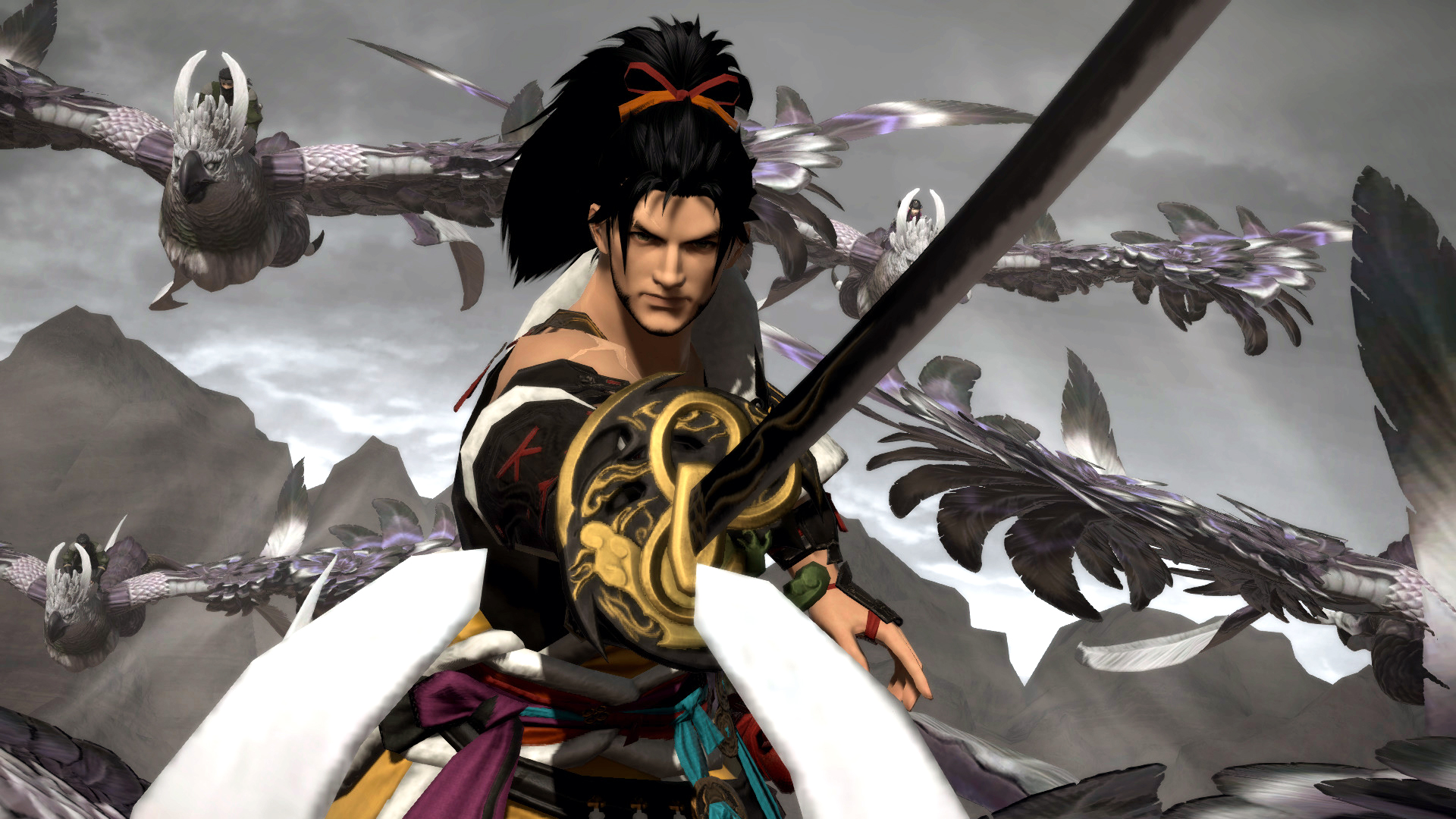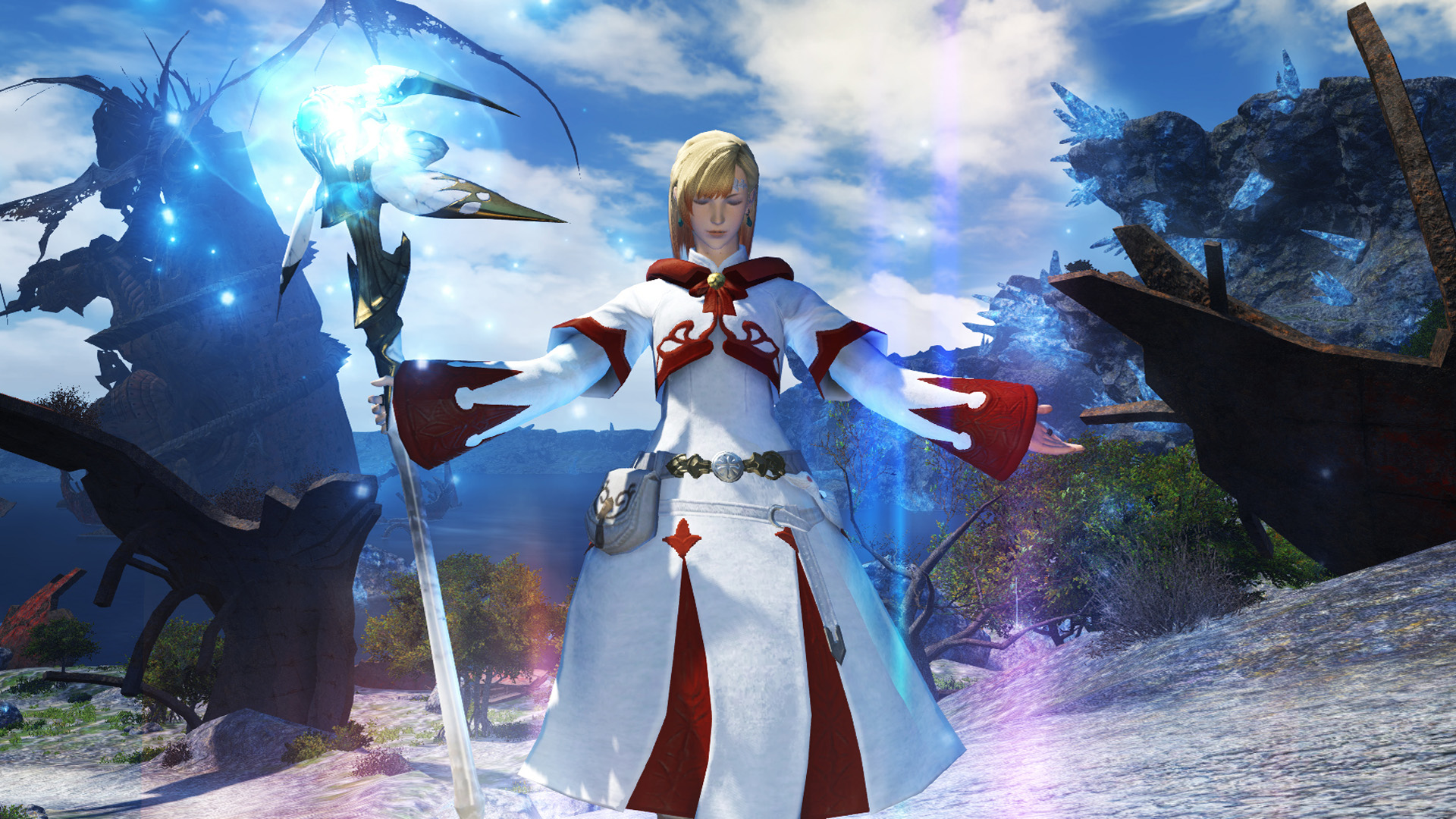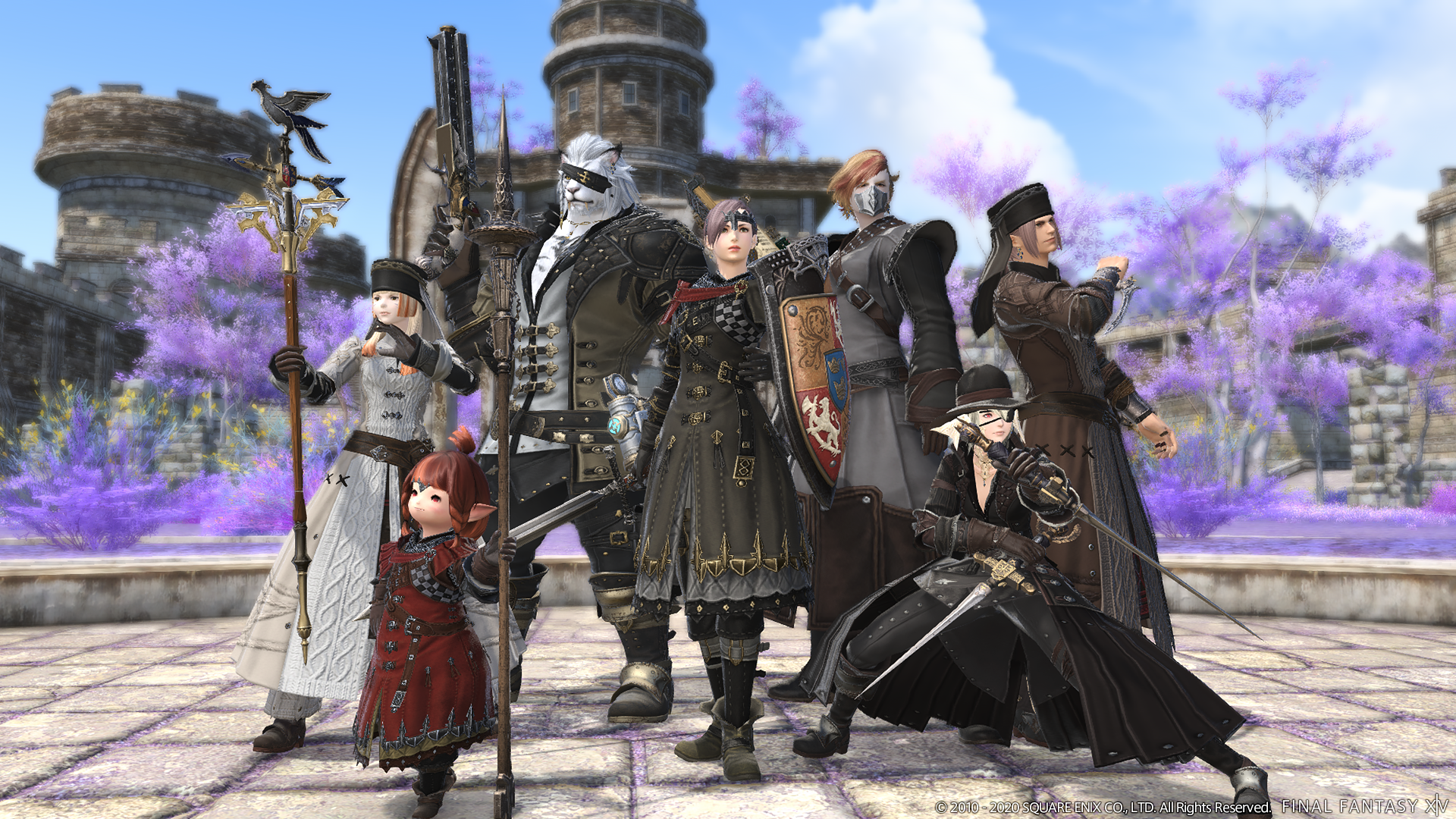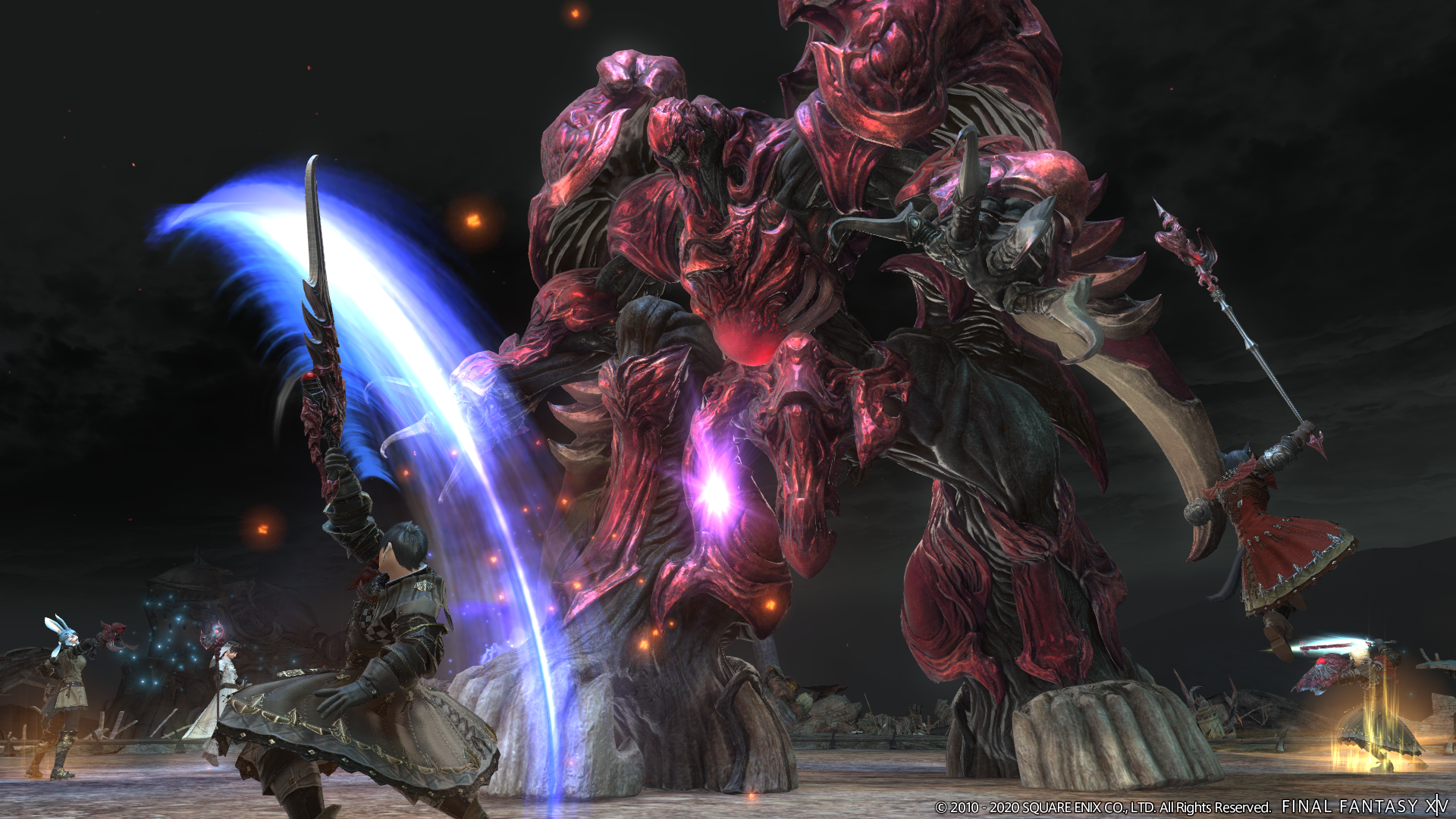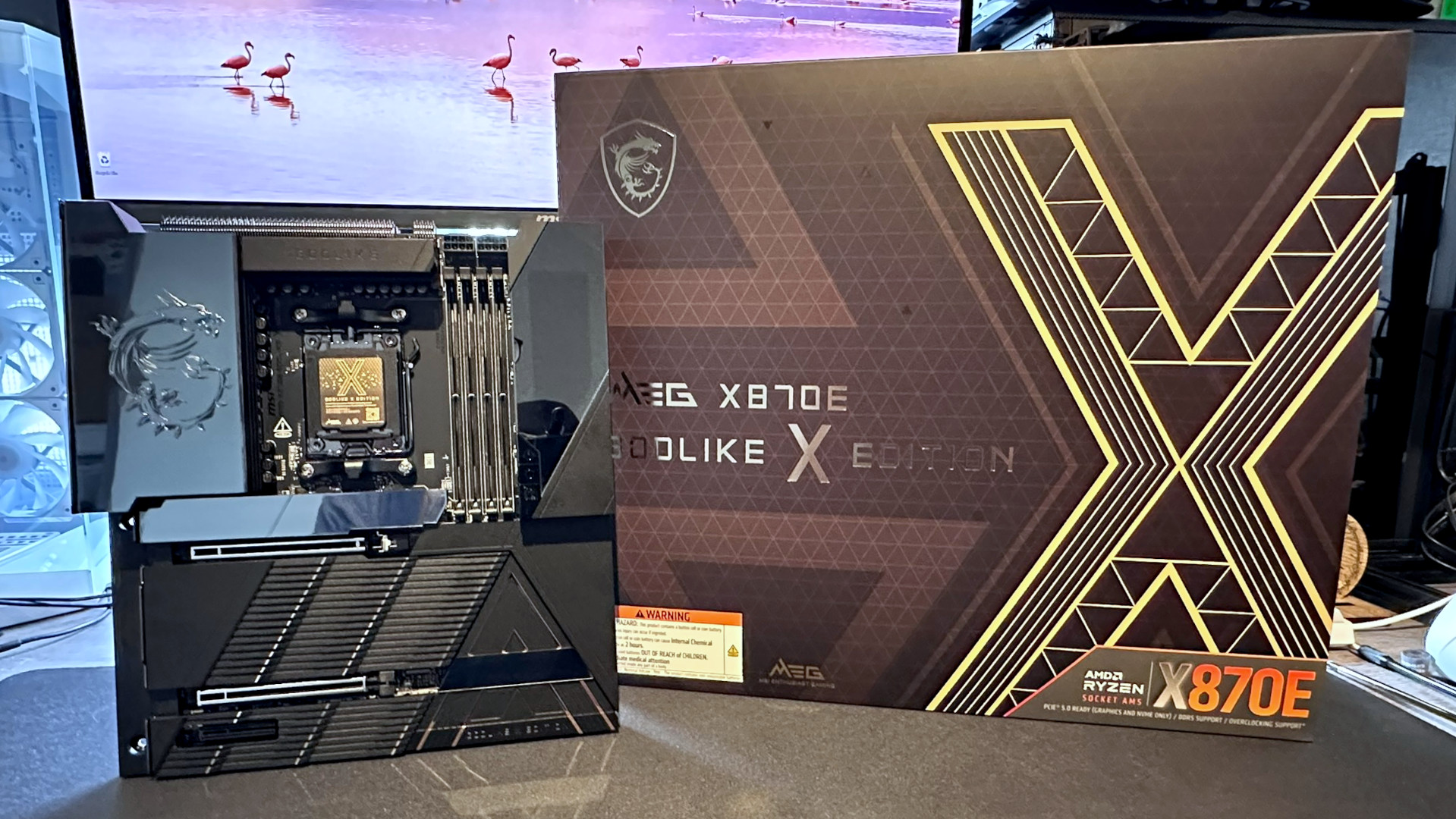How Final Fantasy 14 clawed its way back from disaster to become 2020's best MMO
For the seventh anniversary of its relaunch, we spoke to game director Naoki Yoshida about FF14's incredible comeback and ongoing success.
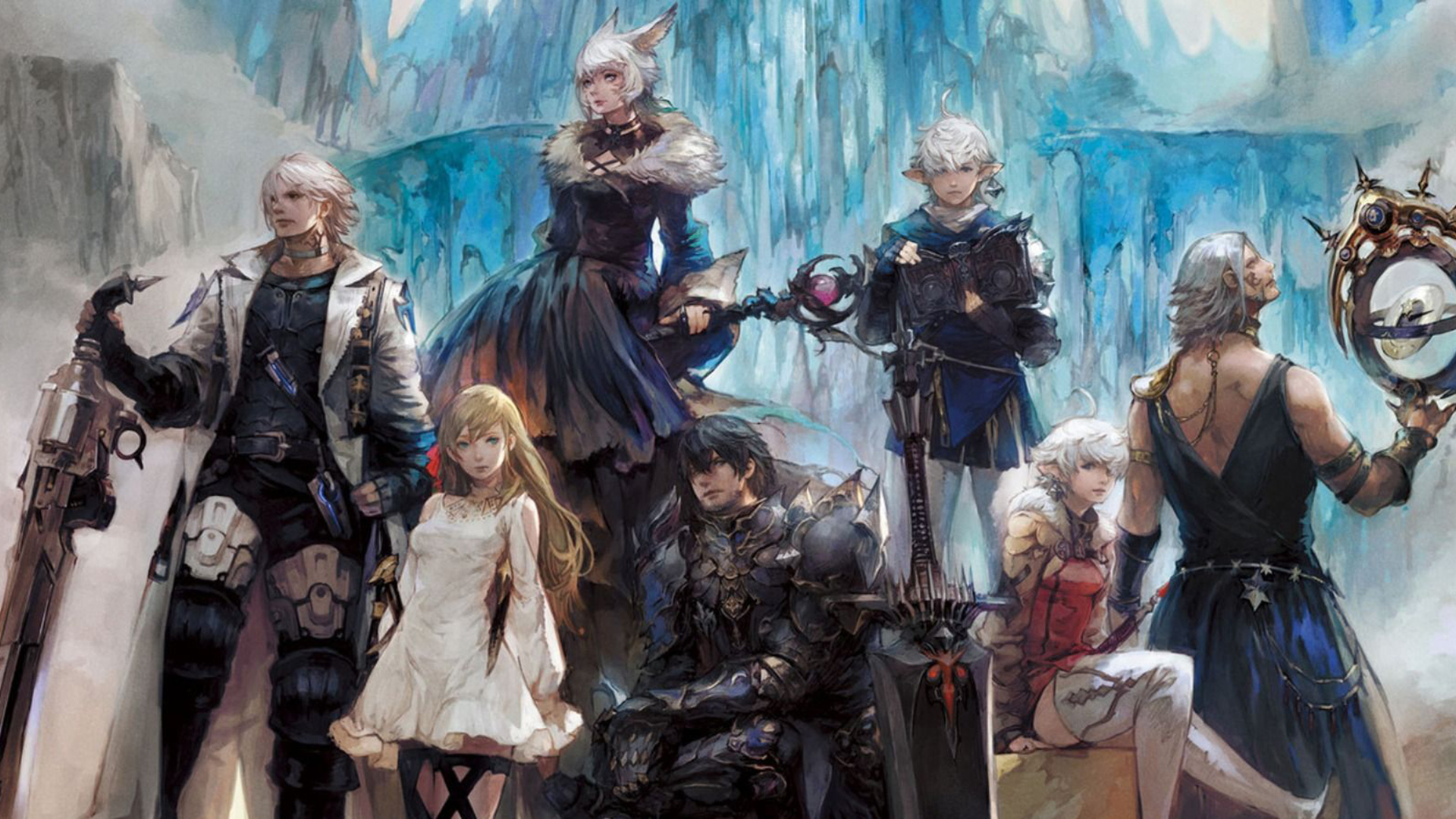
It was in a Los Angeles hotel room that Final Fantasy 14 game director Naoki Yoshida got his first hint that he might pull off the impossible. For three years he had been striving to answer one question: Could you save a dying MMO? Conventional wisdom, backed up by decades of dead MMOs, said no. But Yoshida is an optimist. "At the time, the criticism for Final Fantasy 14 was so harsh that we were at rock bottom," he laughs. "There really was nowhere else to go besides up."
It was E3 2013, and Yoshida had traveled from Japan to L.A. with global community producer Toshio Murouchi to help Square Enix build excitement for the relaunch of FF14 happening in just two months. At 2 a.m. on the last night of the event (early evening in Japan), FF14: A Realm Reborn's third beta test was scheduled to begin. Unlike the two tests before it, Phase 3 was almost a complete game—players could try out overhauled systems like combat, the new user interface, and even the first bit of the main story at the same time. In the column he used to write for Famitsu, Yoshida said that this moment was "truly do-or-die."
It seemed hopeless, but Yoshida had a secret weapon: Microsoft Excel
"We were exhausted from [E3] itself," Yoshida recalls. "But this phase was where we got to start seeing the players, their reaction, and what they felt after playing the game. There was a sort of excitement that night. Murouchi and I, we didn't sleep. We pulled an all-nighter just monitoring the situation. It was this FF14 world strategy war room in this tiny hotel room."
The stakes were unbelievably high. The first version of FF14 released to brutally negative reviews and outrage from its community. It was an unmitigated disaster. To save not only the game but also Final Fantasy's reputation, Square Enix put Yoshida in charge of an ambitious project to rebuild the entire thing from the ground up in just 2.5 years. It seemed hopeless, but Yoshida had a secret weapon: Microsoft Excel.
A single, colossal, and shockingly detailed spreadsheet turned the overwhelming prospect of building an entire MMO into a step-by-step plan that accounted for everything—even bathroom breaks.
As the beta test opened, there was an initial rush of panic as servers buckled from the sudden load. For a few hours that morning, Yoshida, Murouchi, and the development team back in Japan scrambled to fix the crashes and respond to frustrated players. But as the servers stabilized and more people got into the resurrected world of Eorzea for the first time, an eerie silence settled over Square Enix's social media channels. "It became very quiet," Yoshida says. "It made me wonder if the servers went down because I wasn't hearing anything—no one was contacting me, so we were like, 'what's going on?'"
Nothing was going on—the community was just fully absorbed in A Realm Reborn.
Keep up to date with the most important stories and the best deals, as picked by the PC Gamer team.
Not so final after all
FF14 today might seem far removed from its disastrous origin story. Square Enix recently released its 21st major update—one of its biggest not counting the three main expansions—and it's now been played by more than 20 million people worldwide. That success is even more surprising when you consider that FF14 is one of the few MMOs that still charges a subscription fee in an era where free-to-play dominates the genre. But the truth is the dismal days of FF14 1.0, which shaped its rebirth, are also the foundation of its bright future.
I've been playing FF14 since A Realm Reborn launched seven years ago, sinking an embarrassing number of hours into my White Mage. Unlike other MMOs, which frequently feel like they're crumbling under the size of their own world and story, FF14 has quietly become one of the best games in the entire series. It's like a TV show that just gets better with each new season as it digs deeper into the emotional core of its main characters while slowly peeling back the mysteries of the universe and the gods that rule it. This is Final Fantasy, after all.
During that journey, what's kept me playing is how consistent FF14 is. I've lived through the amazing highs and depressing lows of World of Warcraft and other MMOs, where the joy of an amazing expansion can feel undone by the flaws of the next.
When Mr. Yoshida talks to his staff, he doesn’t simply order them to do a task
Mitsutoshi Gondai
The secret sauce of FF14's success is possibly the least sexy thing in game development: Spreadsheets, communication, and a lot of hard work. Yoshida says that A Realm Reborn's development wasn't just challenging because of the enormous task of saving its future, but also because the team only had two and a half years to do it—half the time the original FF14 took to develop and decidedly less than most other MMOs.
Coming up with a list of every major feature that would be in the reboot was just the first part of Yoshida's job. He was also in charge of ensuring everything came together on time. "Creating this list of game content can be a lengthy process," development supervisor Mitsutoshi Gondai tells me. "Yet Mr. Yoshida was able to utilize his excellent communication skills, his earnest attitude towards games as a whole, and his natural talent as a game creator to compile the necessary information very quickly. He also made it a point to walk the staff members through these plans verbally while providing his reasoning behind it, and not simply sharing the list of elements for their reference."
"It might seem like a very top-down sort of workflow at first glance, but when Mr. Yoshida talks to his staff, he doesn’t simply order them to do a task but instead explains how creating a certain element with a particular intent is important to the overall game. Each member of the team understands the meaning and importance of their work, and they can stay motivated as they work on the game. I believe that was a very important thing to keep in mind."
Square Enix didn't have months to waste deliberating over what features this new version of FF14 would have, and many members on the team didn't have experience developing MMOs or even playing them. So Yoshida pulled together a crack team of experts from both inside Square Enix along with new hires and threw together a complete design document in a matter of weeks by drawing on his own extensive experience as an MMO player. Long before he worked at Square Enix, Yoshida had been hopelessly addicted to EverQuest, Dark Age of Camelot, Ultima Online, and World of Warcraft. It was years of all-night sessions playing these MMOs (as well as helping create Japanese-only MMO Dragon Quest X) that informed his vision for a new FF14 that the entire team could get behind.
Break it down
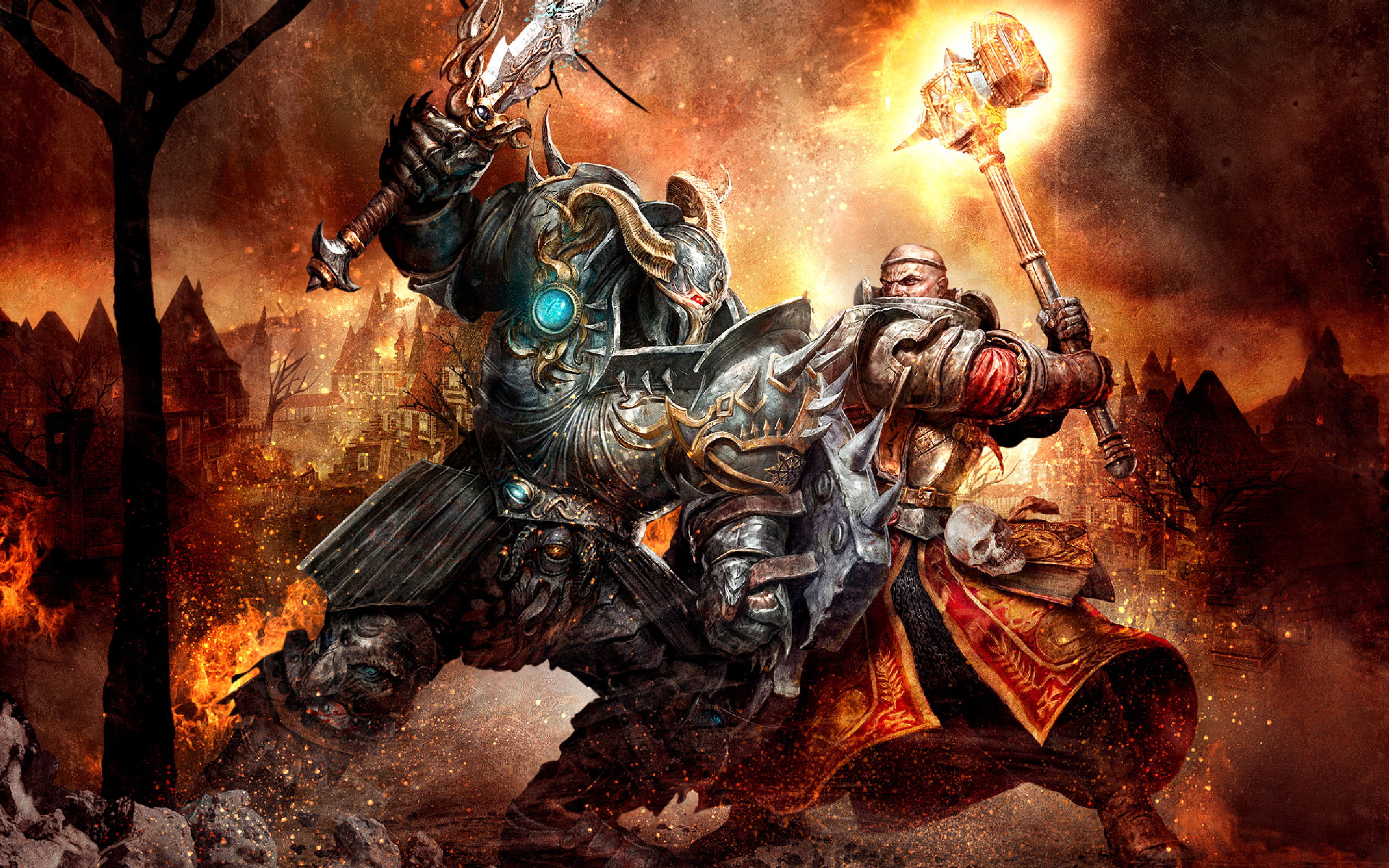
- The best MMOs to play today
- 100,000 fans are finally playing City of Heroes again
- The untimely death of Warhammer Online
- How ESO's laziest player started a wholesome cult
Time was of the essence, and one of the biggest failures in the original FF14 was due to how little oversight its developers had into the day-to-day production process.
In the No Clip documentary, Yoshida explains that, in order to meet the impossible deadline for A Realm Reborn, he broke every development task into its smallest constituent parts and then had each developer give a minimum and a maximum estimate for how long it might take to complete. All of that was collected into an enormous spreadsheet that factored in everything from meetings to bathroom breaks to give Yoshida a complete yet granular view of the FF14's development. Every single task, from endgame progression to the leaves of a tree in the forested city of Gridania was broken down like this. It required one hell of a spreadsheet.
What's fascinating is how that process shaped the game itself. The latest update, for example, reworks the entire story of A Realm Reborn to remove some of the bloat and grind that made the story drag. But the problems with A Realm Reborn wasn't with the story; it was how it was told through rote quests.
"We didn't have much time to develop ARR, and at the same time the staff members that were working on the title, their understanding of MMOs was very scattered," Yoshida says. "In order to mitigate that, we set a rule that one quest would have a certain number of experience points delivered per content, and then it would take about nine minutes to complete each quest. No matter what the quest was, no matter how trivial it was, even if you skipped through all the text and dialogue, it would still take about nine minutes."
It might seem arbitrary, but making every quest equally sized makes sense when you're trying to plot out and develop a 50-hour story under a tight deadline. And A Realm Reborn's rigid quest structure only really became noticeable in hindsight as the development team became more confident and capable. At the time of its release, I just remember being overwhelmed with how much FF14 had improved. Tedious quests were an easy flaw to overlook.
A Realm Reborn impressively reimagined many MMO cliches. I'd killed my fair share of MMO raid bosses by 2013, but I'll never forget the spectacle of fighting the primal demigod Garuda for the very first time. Instead of just finding her waiting for us in an arena like in every other MMO, I watched her descend like an angel from the heavens as ominous organ music piped—electric guitar sweeping in as she unleashed a furious tornado that trapped my party in her lair. At that moment, FF14's unique infusion of JRPG dramatics was a revelation.
"In order for fans of the Final Fantasy series to enjoy FF14, we placed heavy emphasis on the singleplayer story," Gondai says. "We created a game in which the player interacts with the world as the protagonist, and included cutscenes that build excitement for the story, as well as various solo battle events. I think this structure is one of the reasons why so many players have received this game so well."
FF14 isn't the first MMO to take this approach, but consistency is the key. As the team moved from A Realm Reborn into the Heavensward expansion and onward, the story always remained front and center, bolstered by setpiece boss fights that felt bespoke and meaningful because they were so closely tied into the story as a whole. You weren't just killing monsters in some nefarious dungeon because they looked cool and had good loot. Everything tied into a story about you and a group of badasses fighting to dismantle the imperialist Garlean Empire (and threats often far worse).
Having played MMOs for so many decades, Yoshida didn't like how long players often had to wait between updates. "Looking at it from a player's perspective, having more than a four-month gap was a little too much—even if it was a major update," he says. "I thought to myself, how would we have to package the game if we wanted to have a major update every three or four months?"
It's a major problem for virtually every MMO. Even World of Warcraft infamously left players high and dry for 13 months at the end of the Warlords of Draenor expansion, leading to one of the darkest times in Warcraft history that, in some ways, still hangs over the game. Yoshida made certain FF14 wouldn't repeat those mistakes.
The key is that these conversations were happening in tandem with A Realm Reborn's development instead of after. When it was released in 2013, Yoshida already had a roadmap of every major update including the Heavensward expansion that wouldn't launch for another two years. That kind of forethought and rigorous planning enabled an unprecedented post-launch update schedule.
Instead of patches arriving irregularly, FF14 gets a major update every 3.5 months like clockwork. Of the 21 major patches that have been released since its launch—each one adding hours of new story, dungeons, raids, and other big features—the only one to miss its deadline was because of the COVID-19 pandemic. "The plan was already set for up to two years in advance and my team were working off of that roadmap and going off of this sheet and creating content and trying to get through all of that," Yoshida says. "We had a good foundation from the get-go."
I think a major factor [of our success] is our ability to make consistent updates according to our overall schedule and release plan.
Natsuko Ishikawa
"I think a major factor [of our success] is our ability to make consistent updates according to our overall schedule and release plan," main scenario writer Natsuko Ishikawa says. "People often say a strength of FF14 is the game’s ability to put a strong emphasis on the story experience even though it is an MMORPG. In order to make that a reality, it is extremely important to have an update plan and schedule that supports that goal."
Hoping to get some outside perspective on the challenges of maintaining a live service game, I reached out to Rebecca Ford, Warframe's live ops and community director. Like FF14, Warframe was a game built in extremely dire circumstances that, against all odds, managed to find enormous success. Ford says the way FF14 has consistently grown is "mindblowing."
She started playing FF14 earlier this year and says she's fallen in love with the game—but also, as a developer on another online RPG, she's fascinated by what Square Enix has achieved. "The cadence in which they update, their approach to updates, and the positivity surrounding it is just great. I just love it."
Unlike A Realm Reborn, Warframe was rapidly built in just over a year as Digital Extremes scrambled to release the game before going bankrupt after no publisher wanted to back an early prototype. "Because of that, [Square Enix is] capable of roadmapping in such a way, whereas for us, it's like, we're putting the rail down in front of us as we're going because we've never had two years to plan [like that]" Ford says. "I don't know if one's better than the other either, but I have taken a very serious effort into not only playing the game for my own enjoyment but also just understanding how they are achieving what they're doing and what their guiding principles are as a team."
Brothers in arms
Every time I look into the abyss of FF14, I just have a voice in my head saying they salvaged this
Warframe's Rebecca Ford
While Warframe and FF14 might not seem like they have much in common, both games share surprisingly similar stories. They were exceedingly risky, last-ditch attempts that only paid off partly because of the incredible determination of their developers, but also because they were able to foster devoted communities who rode out the hard times.
When I ask Yoshida what compelled that motivation to rebuild trust instead of just sweeping FF14 under the rug and forgetting it ever happened, he tells me about the players who continued playing FF14 1.0 even when everyone else had quit. "There were players that continued to stay with us [because] they believed in us," he says. "We call them our Legacy players. They're our cornerstone, our foundation, our allies—even to this day."
It was those people Yoshida had in mind when Square Enix first issued a public apology and vowed to fix FF14 1.0. And as development on A Realm Reborn began in earnest, Yoshida felt a responsibility to keep that dialogue open with players to show how hard the team was working. That was the origin of Letter From the Producer, a recurring livestream that Yoshida and the team do to share progress on development and address issues directly with their fans.
It's easy to take dev streams for granted in 2020 because they've become such a common part of gaming. But back in 2013, Yoshida says that idea felt very new. In his Famitsu column, he explains it was inspired by his time playing Dark Age of Camelot and how nonchalantly the developers interacted with their players. It's just another way Yoshida's personal experience with MMOs had a big impact on FF14.
Those livestreams were an invaluable window into not only the development of Final Fantasy 14, but the motivation of the team making it. During the launch event of A Realm Reborn, Final Fantasy 14 proved so unexpectedly popular that it caused widespread server issues in North American and Europe that prevented many players from logging in for days. It's a story as old as the genre itself. Yoshida could've just laughed it off or avoided addressing the issue personally, but during a livestream of the launch event, he instead broke into tears as he apologized for the server issues and reflected on the long journey to that moment.
This kind of raw sincerity from the development team permeates Final Fantasy 14. It's created one of the most positive dev-player relationships I've ever seen. When it was announced that Ishikawa had been promoted and was writing all the main story quests for Shadowbringers at Pax West, players gave her a standing ovation.
"There's this layer of authenticity that you get immediately from the Final Fantasy 14 team," Ford says. "They already had all the issues out of the way early with FF14 1.0, but then A Realm Reborn happened and you had that "aha!" moment where the capabilities of the team and the authenticity of their goals were front facing right away. And they've maintained that update after update. Every time I look into the abyss of FF14, I just have a voice in my head saying they salvaged this. A Realm Reborn was everything to them, and you can kind of just feel that sense of joy, like, as a developer in continuing the lifespan of something that was doomed. I think, from a development point of view, when you have that turnaround story, it motivates you for a long time."
New dawn
The feeling that we're all in this together hasn't changed over the course of seven years.
Naoki Yoshida
As my interview with Yoshida winds to a close, I can't help but think of the legacies of MMOs past. Yoshida's now-retired Famitsu column was filled with nostalgic rants about the time he was scammed in Ultima Online or the unfortunate episode where a hopeful guild member in Dark Age of Camelot found out that he wasn't a woman like his character and, out of spite, stopped casting helpful spells on him during group fights.
When I ask Yoshida what kind of legacy he hopes Final Fantasy 14 will leave one day, he says he isn't sure. "FF14 hasn't ended yet, and there's so many plans for the future," he says. "Our blood, sweat, and tears are going into this. But if I were to give an example, having a strong relationship with the player community is such a positive effect to a particular game, and I think that Final Fantasy 14 is proof of that phenomenon."
"I feel like we're all in this together, we're creating something together," he adds. "I see players reaching out to their friends about FF14 saying, hey, this is such a fun game, there are so many things improved in this game, and they actively go out on their own initiative to invite their friends and grow that base. I feel like that makes us different from some of the other games. Just that strength of our bond, the camaraderie—the feeling that we're all in this together, hasn't changed over the course of seven years, and I think having that as our foundation in such an intense way is a really big element [of our success]."
A lot has happened since Yoshida and Murouchi stepped out of that stuffy hotel room in 2013 and blinked at the hazy sun rising over Los Angeles. But that obligation to make things right, that motivation as Ford calls it, has carried Final Fantasy 14 through three increasingly great expansions with a fourth likely coming late next year. What lies in store is a mystery, but I'm sure Yoshida and the development team have it all meticulously laid out in a spreadsheet somewhere.
With over 7 years of experience with in-depth feature reporting, Steven's mission is to chronicle the fascinating ways that games intersect our lives. Whether it's colossal in-game wars in an MMO, or long-haul truckers who turn to games to protect them from the loneliness of the open road, Steven tries to unearth PC gaming's greatest untold stories. His love of PC gaming started extremely early. Without money to spend, he spent an entire day watching the progress bar on a 25mb download of the Heroes of Might and Magic 2 demo that he then played for at least a hundred hours. It was a good demo.
